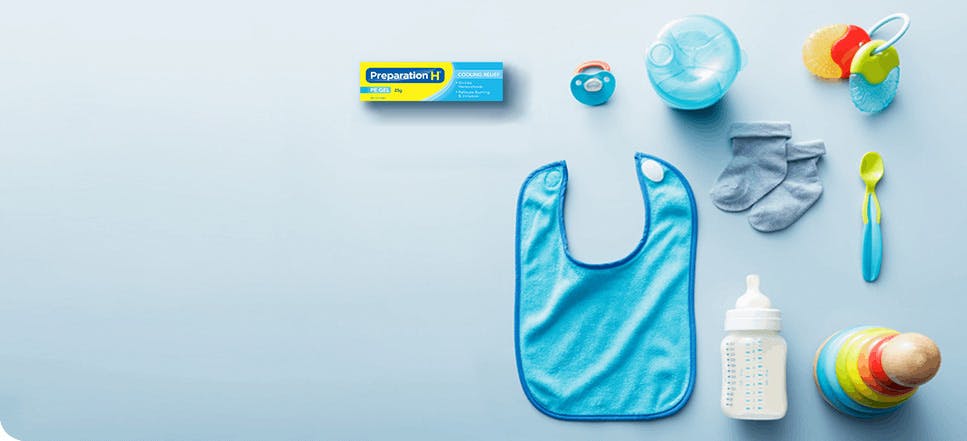Pregnancy is an exciting time, filled with anticipation and change. But one of the changes you may not have expected – and a slightly less exciting prospect – is hemorrhoidal discomfort during pregnancy or after childbirth.
Funny how no one seemed to mention this at the baby shower…
Symptomatic hemorrhoids is a condition where your hemorrhoids, blood vessels found in the wall muscles of the rectum and anus, are swollen, dilated, or inflamed. Pregnancy is known to cause or trigger flare-ups of this condition, causing pain, itching, irritation, burning, and sometimes bleeding. It’s also common to suffer from hemorrhoids after delivery.
Learn more about hemorrhoids with Preparation H and find out how to treat hemorrhoids when you’re pregnant below.
WHAT CAUSES HEMORRHOIDS DURING PREGNANCY?
There are a variety of reasons pregnancy can cause symptomatic hemorrhoids, including:
- A pregnant woman's enlarged uterus increases pressure in the hemorrhoidal veins.
- Blood supply actually increases during pregnancy, raising the pressure within the veins.
- Pregnancy hormones tend to relax the anorectal area's supporting muscles as the baby presses more and more on the veins below it.
Pregnancy often causes constipation. So, it’s no wonder that pregnancy can cause hemorrhoids. Rest assured, pregnancy-related hemorrhoidal discomfort is not only common, it’s treatable.
HOW TO TREAT HEMORRHOIDS DURING PREGNANCY
You can help prevent hemorrhoidal discomfort when you’re pregnant, or minimize flare-ups, by making simple lifestyle changes:
Gently cleanse the area
Use Preparation H Soothing Wipes following childbirth to gently cleanse and soothe the irritated area. They fit right into your diaper bag.
Drink water
Drinking plenty of water every day can help reduce the risk of constipation and keep bowel movements soft and easy to pass, reducing your risk of flare-ups.
Eat a balanced, high-fiber diet
With your healthcare provider's approval, follow a balanced diet that is rich in fiber to help prevent constipation.
Get some exercise
A little physical activity can aid in digestion and tone the supporting muscles of the anal and rectal area as well as the abdomen. With your healthcare provider's approval, walk or do other non-strenuous activities.
Do Kegel exercises
Kegel exercises help strengthen the pelvic floor as well as anal and rectal muscles – particularly after childbirth. This can help reduce your risk of hemorrhoids after delivery. To do a Kegel exercise, tighten your vaginal muscles (as you would if you needed to stop urinating midstream), hold it for a few seconds, release and repeat several times. It's a discreet exercise you can do almost anywhere.
When you got to go, go
Holding in a bowel movement may contribute to chronic constipation. It's important to set aside time to use the bathroom.
Maintain a healthy weight
Extra weight can put more pressure on your abdomen, which increases your chances of experiencing hemorrhoidal discomfort. So, try to stay within the weight guidelines your healthcare provider sets.
Try not to stand or sit for long periods
Prolonged periods of sitting or standing can put pressure on your rectum and cause hemorrhoidal discomfort. If you’re sitting and nursing for long periods, try other positions, such as reclining, or sitting on an O-ring cushion.
Soak hemorrhoids in warm water
Fill a tub or sitz bath with warm water (not hot) and bathe the area. Don’t use soap or bubble bath.
Use topical treatments
Over-the-counter products containing witch hazel can help to relieve pain and discomfort. Ask your doctor for remedies they recommend that are safe for use during pregnancy.
Always check with your healthcare provider before starting any diet or exercise plan.

.png?auto=format)

